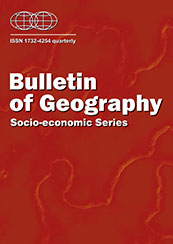Municipal waste recycling in big cities in Poland in the context of ecologisation
DOI:
https://doi.org/10.2478/bog-2019-0009Keywords
waste management, recycling, separate collection, municipal waste, ecologisation, cities, PolandAbstract
The goal of the paper is to evaluate and analyse changes in selective municipal collection, recycling level, and recovery, of waste. The article indicates the Polish legislation currently in force to systematise the organisation of waste management systems. It presents the participation of selective waste collection in the total municipal waste at the voivodeship scale, as well as changes in the number of individually segregated fractions (i.e. categories of waste segregation) of selectively collected waste in Poland. Moreover, the levels of waste recycling and recovery were analysed for the country’s ten largest cities, while also showing that the cities implement accepted goals of municipal waste recovery. On the example of Warsaw, the structure of collected waste was discussed and attention was paid to the problem of quality of collected waste, which results in it being sent to sorting facilities.
References
Arsovski, S., Kwiatkowski, M., Lewandowska, A., Jordanova Peshevska, D., Sofeska, E. and Dymitrow, M. (2018). Can urban environmental problems be overcome? The case of Skopje—world’s most polluted city. Bulletin of Geography. Socio-economic Series, 40(40), 17–39. DOI: http://doi.org/10.2478/bog-2018-0012
Dyson, B., and Chang, N.B. (20050 Forecasting municipal solid waste generation in a fast-growing urban region with system dynamics modeling. Waste Management, 25(7), 669-679. DOI: https://doi.org/10.1016/j.wasman.2004.10.005
Cointreau, S. (1987). Solid waste recycling: Case studies in developing countries. Washington, USA: World Bank.
Ewing, G. (2001). Altruistic, egoistic, and normative effects on curbside recycling. Environment and Behavior, 33(6), 733-764. DOI: https://doi.org/10.1177/00139160121973223
Hjemdahl, P. W. and Balasubramanian, S. (2018). To What Extent Would Operational Restructuring Through Connecting Market Participants Streamline the Informal Recycling Industry in Urban India?, Joseph Wharton Scholars. Available at https://repository.upenn.edu/joseph_wharton_scholars/47 (19.04.2018).
Hryb, W. (2015). Recykling odpadów komunalnych w Polsce–stan obecny i perspektywy rozwoju (Recycling of municipal wastes in Poland - current status and development prospects). Archiwum Gospodarki Odpadami i Ochrony Środowiska, 17(1), 9-16. http://awmep.org/?journal=ago&page=article&op=view&path%5B%5D=469 (20.05.2018).
Kumar, A., Samadder, S. R., Kumar, N. and Singh, C. (2018). Estimation of the generation rate of different types of plastic wastes and possible revenue recovery from informal recycling. Waste Management, 79, 781-790. DOI: https://doi.org/10.1016/j.wasman.2018.08.045
Lehmann, S. (2010). Resource recovery and materials flow in the city: Zero waste and sustainable consumption as paradigms in urban development. Sustainable Development Law & Policy, 11(1), 28-38. Available at: http://digitalcommons.wcl.american.edu/sdlp/vol11/iss1/13 (20.06.2018).
Lewandowska, A. (2018). Economics of waste management in poland in the context of regional ecologization as exemplified by kujawsko-pomorskie voivodship. Electronic Journal of Polish Agricultural Universities, 21(1). Available at: http://www.ejpau.media.pl/volume21/issue1/art-01.html (18.01.2018).
Leźnicki, M. and Lewandowska, A. (2016). Contemporary concepts of a city in the context of sustainable development: perspective of humanities and natural sciences. Problemy Ekorozwoju, 11(2), 45-54. Available at: http://ekorozwoj.pol.lublin.pl/no22/h.pdf (10.03.2018)
Linzner, R. and Salhofer, S. (2014). Municipal solid waste recycling and the significance of informal sector in urban China. Waste Management & Research, 32(9), 896-907. DOI: https://doi.org/10.1177/0734242X14543555
Local Data Bank of Central Statistical Office, Available at: https://bdl.stat.gov.pl/BDL/start, (20.01.2018).
Medina, M. (2008). The Informal Recycling Sector in Developing Countries: Organizing Waste Pickers to enhance their impact. Grid Lines. Available at: http://www.ppiaf.org/sites/, (12.01.2018).
Morrissey, A.J. and Browne, J. (2004). Waste management models and their application to sustainable waste management. Waste Management, 24(3), 297-308. DOI: https://doi.org/10.1016/j.wasman.2003.09.005
Seadon J.K. (2010). Sustainable waste management systems. Journal of Cleaner Production, 18(16), 1639–1651. DOI: https://doi.org/10.1016/j.jclepro.2010.07.009
Sembiring, E. and Nitivattananon, V. (2010). Sustainable solid waste management toward an inclusive society: Integration of the informal sector. Resources, Conservation and Recycling, 54(11), 802-809.DOI: https://doi.org/10.1016/j.resconrec.2009.12.010
Scheinberg, A., Spies, S., Simpson, M.H., and Mol, A.P. (2011). Assessing urban recycling in low-and middle-income countries: Building on modernised mixtures. In: Habitat International, 35(2), 188-198. DOI: https://doi.org/10.1016/j.habitatint.2010.08.004
Spaargaren, G. and Van Vliet, B. (2000). Lifestyles, consumption and the environment: The ecological modernization of domestic consumption. Environmental politics, 9(1), 50-76. DOI: https://doi.org/10.1080/09644010008414512
Szymańska, D., Korolko, M., Grzelak-Kostulska, E. and Lewandowska, A. (2016). Ekoinnowacje w miastach (Ecoinnovations in cities – in Polish). Wydawnictwo Naukowe Uniwersytetu Mikołaja Kopernika, Toruń.
Szymańska, D. and Lewandowska, A. (2018). Disposal of asbestos and products containing asbestos in Poland. Journal of Material Cycles and Waste Management, 1-11. DOI: https://doi.org/10.1007/s10163-018-0796-4
UN-Habitat (2010). Solid Waste Management in the World’s Cities: Water and Sanitation in the World’s Cities 2010.
Wang, H. and Nie, Y. (2001). Municipal solid waste characteristics and management in China. Journal of the Air & Waste Management Association, 51(2), 250-263.
Wilson D.C., Velis C., and Cheeseman C. (2006). Role of informal sector recycling in waste management in developing countries. Habitat International, 30(4), 797-808. DOI: https://doi.org/10.1016/j.habitatint.2005.09.005
Van Vliet, B., Shove, E., and Chappells, H. (2012). Infrastructures of consumption: Environmental innovation in the utility industries. Earthscan.
Zaman, A. U. and Lehmann, S. (2013). The zero waste index: a performance measurement tool for waste management systems in a ‘zero waste city’. Journal of Cleaner Production, 50(1), 123-132. DOI: https://doi.org/10.1016/j.jclepro.2012.11.041
Zębek E. M., and Raczkowski M. (2014). Prawne i techniczne aspekty gospodarowania odpadami komunalnymi (Legal and technical aspects of municipal waste management) – in Polish. Przegląd Prawa Ochrony Środowiska, (3), 33-51. DOI: http://dx.doi.org/10.12775/PPOS.2014.028
Downloads
Published
How to Cite
Issue
Section
License
Copyright (c) 2019 Bulletin of Geography. Socio-economic Series

This work is licensed under a Creative Commons Attribution-NoDerivatives 4.0 International License.
Title, logo and layout of journal Bulletin of Geography. Socio-economic Series are reserved trademarks of Bulletin of Geography. Socio-economic Series.Stats
Number of views and downloads: 1054
Number of citations: 7



